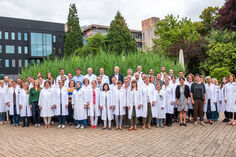Gut Microbiome profile as a diagnostic marker in Anorexia Nervosa
Summary
Anorexia Nervosa (AN) is an eating disorder with high morbidity and lifetime mortality. AN is mainly characterized by restricted food intake despite a severely low body weight. The gut microbiota is essential in the regulation of appetite and body weight and has been found to be altered in AN. Specifically, previous research has identified gut microbiota dysbiosis as a potential pathognomonic aspect of AN. Accordingly, changes in microbiota composition and production of bioactive metabolites may contribute to the development and/or maintenance of AN. In this project, we plan to longitudinally assess gut microbiota composition and function in patients with AN during in-house treatment to gain a better understanding of microbiome changes associated with progression or remission of AN. In line with similar investigations in obesity, where variations in the gut microbiome allow classification of individuals according to their propensity of further weight gain, we aim to establish an AI-based diagnostic procedure for the classification of patients into different profiles of disease progression.
Project management
Project coordination
Working group:
Dr Rebecca T. Levinson, Wolfger Tripathi
Cooperation partners:
Dr Georg Zeller (EMBL Heidelberg), Wally Wünsch-Leiteritz (Klinik Lüneburger Heide), Mark Leiteritz (Klinik Lüneburger Heide).
Duration:
January 2023 - December 2024
Funded by:
AI Health Innovation Cluster









